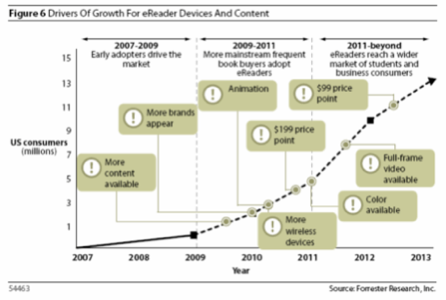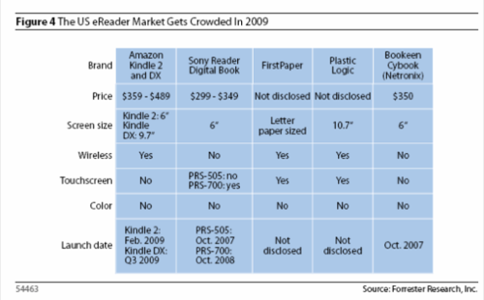According to a new report from Forrester, the eBook and eReader market has now hit a point where it is ready to break out of its niche and become a mainstream phenomenon. In the report, Forrester’s Sarah Rotman Epps argues that while early readers like the Rocket eBook in 1998 and the Sony Librié in 2004 failed to garner a large enough audience, today’s consumers have embraced mobile, on-the-go media consumption thanks to the prevalence of MP3 players and handheld video games. Thanks to this, consumers are now also more likely to buy electronic goods than ever before.

Epps acknowledges that Forrester’s initial reaction to the Kindle as a niche device that would only attract a small number of book-loving early adopters underestimated the fact that consumers would fall in love with the Kindle’s one-step shopping system and the immediate gratification of buying books in the Kindle store. Epps also stresses that while users could easily rip CDs and copy them onto their MP3 players when they first appeared in the 1990s, transferring paper books into an electronic medium is obviously a lot harder. So consumers, for the time being, are more likely to prefer a vendor that can provide an Apple-like integration between the hardware reader and the book store.

Kindle DX and Texbooks
The new Kindle DX is geared towards the textbook market, but Forrester warns that universities will be slow to adopt the technology. The schools that Forrester talked to had no plans to encourage students to use the Kindle and the current pilot project only involves a small number of students (50 at Pace, for example). Of course, this is also a classic chicken and egg problem. Textbook publishers will look at the adoption of the Kindle in schools and are unlikely to invest heavily in this technology unless they see a growing market for their content, while students are unlikely to show interest in eReaders unless all of their textbooks are available in this format.
Looking into the Future: Price, Color, Video – and the End of the Chain Bookstore
Forrester also predicts that the eReader market will soon expand beyond books, especially once eInk technology becomes more mature and maybe even allows for color reproductions. Forrester’s Sarah Rotman Epps expects that newspapers, magazines, comics, and business and personal documents will also soon become more important, especially as other vendors besides Amazon start to produce more compelling devices and user experiences.

We received this report just after we wrote about Google’s expected entry into the eBook market this morning, but the report clearly vindicates Google’s interest in this market. Forrester thinks that other players like Apple, RIM, Borders, and Barnes & Noble might try to enter this market either with hardware products or by offering distribution platforms. Epps, however, argues that while traditional chain booksellers will try to enter the eBook market, their real estate holdings will weigh them down and make it hard, or even impossible, for them to compete with Amazon.
Overall, we agree with Forrester’s assessment of the eBook market. Obviously, we are still very early in the eBook and eReader cycle. It will be interesting to see if any new players will be able to establish themselves in the next year or so, or if we will see a convergence between dedicated eReaders and other mobile devices. Wattpad, one of the larger mobile eBook players, just released an interesting metrics report (PDF), and this company sees about 78% of its eBook usage within the U.S. from iPhone users. Consumers are clearly interested in eBooks, but they are also willing to try out new devices. Even though the Kindle has virtually locked up the market today (at least in the U.S.), the business is still small enough to allow other players to successfully enter the market and be able to conquer the mainstream market.

















